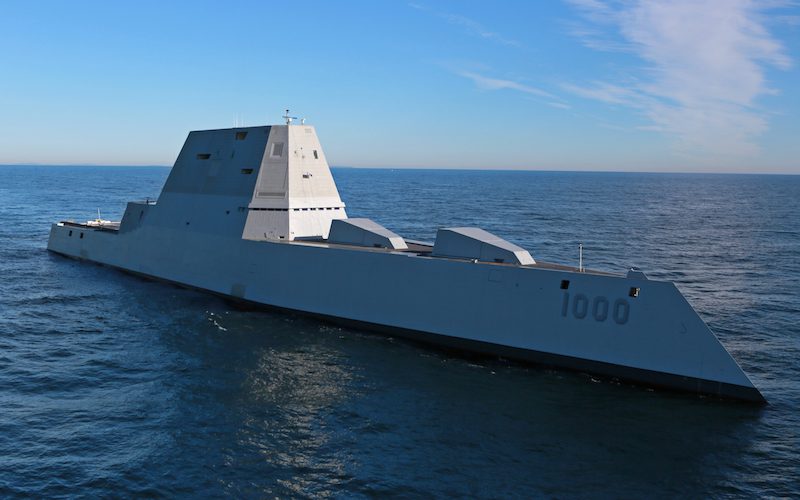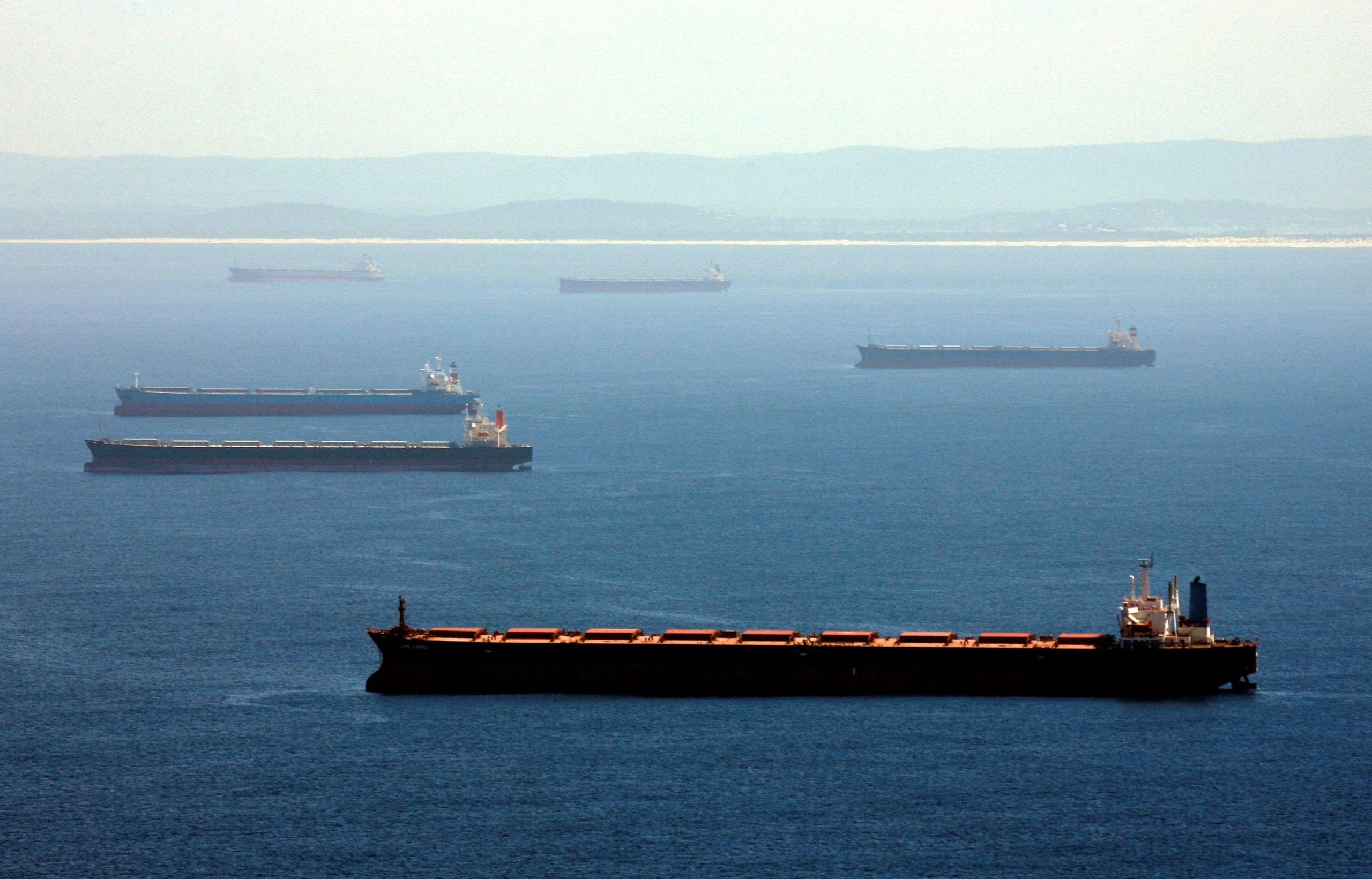The future USS Zumwalt (DDG 1000) is underway for the first time conducting at-sea tests and trials in the Atlantic Ocean Dec. 7, 2015. U.S. Navy Photo
By David Tweed and Toluse Olorunnipa
(Bloomberg) — U.S. officials are looking to superheroes in their quest to preserve Asia’s postwar security order in the face of an increasingly assertive China.
“If Batman had a ship, this’d be it,” Admiral Harry Harris, head of U.S. Pacific Command, told a crowd of Asia specialists in Washington last month as he pointed to a slide of a DDG-1000 Zumwalt-class destroyer, the U.S. Navy’s largest and stealthiest. “Everything that is new and cool that the United States is developing is going to the Asia Pacific.”
Harris’s account of the military component of Barack Obama’s “rebalance to Asia” comes as the president prepares to host leaders from the 10-member Association of Southeast Asian Nations at the Sunnylands estate in California next week. Obama has sought to tighten U.S. influence after the administrations of George W. Bush and others focused more on the Middle East and elsewhere. There’s an economic imperative, too: China overtook Japan to become Asean’s biggest trading partner in 2009, after displacing the U.S. a year earlier.
Holding the summit at the 200-acre estate will allow leaders to spend informal time with Obama, said Ernest Bower, senior adviser at the Center for Strategic and International Studies in Washington. Obama chose Sunnylands for extended “shirt-sleeve” talks with newly minted Chinese President Xi Jinping in 2013.
“The White House sees Sunnylands as a very special treatment, where the president of the United States is leaving Washington and is going to spend two full days exclusively focused on leaders,” Bower said.
The meeting comes amid concern in Washington that a rising China will eventually compel the U.S. to cede ground. Xi has spoken often of a new model of “great power relations” and a military that is better able to project force outward in the region, and is seeking to back that with economic clout.
By 2030, the disputed South China Sea “will be virtually a Chinese lake” as a result of China’s near-constant presence and enhanced regional prestige, according to a Congress-mandated CSIS report released last month. That would upend a security order in place since Japan’s defeat in World War II left the U.S. as the undisputed master of Asia’s seas.
‘Benign Neglect’
“The Bush administration was criticized for having this benign neglect toward the region because of his preoccupation with Afghanistan and the Middle East,” said Dewi Fortuna Anwar, a political scientist at the Indonesian Institute of Sciences. “No region wants to be seen as a momentary convenience. You cannot sustain a relationship when you turn around and only pay attention when you need friends.”
Obama is seeking Asean unity over China’s claims to more than 80 percent of the South China Sea, which are contested by countries like Brunei, Malaysia, the Philippines and Vietnam, said Alexander Sullivan, an associate fellow at the Center for a New American Security in Washington. In the past two years China has reclaimed more than 3,000 acres in the sea, which annually hosts $5 trillion in shipping, and is building military facilities there.
While the Philippines and Vietnam have protested, other Asean states have been more willing to accommodate China and its economic muscle. In November, Asean defense ministers failed to release a communique from their meeting, amid reports of Chinese opposition to language on the disputes. There was a similar failure at a leaders’ summit in Cambodia in 2012.
“The U.S. is trying to get Asean to speak with one voice on the South China Sea issue,” Sullivan said. “It is not competing to divide the body in the same way that I think China is.”
Indonesia is not a party to the South China Sea disputes but wants them resolved through talks, President Joko Widodo told Bloomberg Television this week.
“If the region is not stable, the economy will get into trouble,” he said. “Indonesia wants to play a more active role in resolving the South China Sea issue.”
Asean leaders may look to the U.S. to finally ratify the United Nations Convention on the Law of the Sea, a treaty signed by China, said Anwar, who was an adviser to former Indonesian President BJ Habibie. “If we are talking respect for the rule of law, and the rule of law in the maritime realm is UNCLOS, then the U.S. isn’t exactly strengthening its hand.”
Adding to a sense of urgency is the prospect of a ruling by mid-2016 by an international tribunal on a Philippine case challenging China’s South China Sea claims. China refuses to recognize the suit, saying it will only engage in bilateral talks on disputes.
Kerry Trip
U.S. Secretary of State John Kerry began laying the groundwork for Sunnylands in January, visiting Laos — holder of Asean’s rotating chairmanship this year — and then Cambodia. He finished his trip in Beijing, where he made little headway with Foreign Minister Wang Yi on the South China Sea issue.
Days later, the U.S. sent a warship into waters claimed by China, Vietnam and Taiwan to challenge the “excessive” maritime claims of all three. It was the second time in less than six months the U.S. has challenged China with a freedom-of- navigation voyage.
Obama will seek to deepen U.S. economic engagement with Asean by touting the Trans-Pacific Partnership, a trade deal encompassing a dozen nations including Brunei, Malaysia, Singapore and Vietnam. Indonesia, Thailand and the Philippines have expressed interest in joining.
Silk Road
China is in turn is pursuing its “21st Century Maritime Silk Road,” a network of regional infrastructure projects partly funded by the new Beijing-backed Asian Infrastructure Investment Bank. In December, the Philippines agreed to join the AIIB.
“It is very clear that with nearly half the world’s population, one-third of the global GDP and some of the most capable militaries, the Asia Pacific is increasingly the world’s political and economic center of gravity,” Daniel Kritenbrink, senior director for Asian affairs on the National Security Council, said at a briefing in Washington. “That’s why, from the very beginning of his administration, President Obama has prioritized engagement with the Asia-Pacific region.”
–With assistance from Chris Brummitt.
©2016 Bloomberg News

 Join The Club
Join The Club











